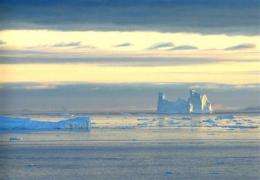New fresh water in Arctic could shift Gulf Stream

Scientists are monitoring a massive pool of fresh water in the Arctic Ocean that could spill into the Atlantic and potentially alter the key ocean currents that give Western Europe its moderate climate.
The oceanographers said Tuesday the unusual accumulation has been caused by Siberian and Canadian rivers dumping more water into the Arctic and from melting sea ice. Both are consequences of global warming.
If it flushes into the Atlantic, the infusion of fresh water could, in the worst case, change the ocean current that brings warmth from the tropics to European shores, said Laura De Steur of the Royal Netherlands Institute for Sea Research.
German researcher Benjamin Rabe, of the Alfred Wegener Institute, said the Arctic's fresh water content had increased 20 percent since the 1990s - about 8,400 cubic kilometers. That is the equivalent of all the water in Lake Michigan and Lake Huron together or double the volume of water in Lake Victoria, Africa's largest lake.
Increased runoff from the great northern rivers "could potentially impact the large scale ocean circulation in the Atlantic Ocean. This is important for us in Western Europe because our climate is pretty much dictated by the Thermohaline ocean circulation," said De Steur.
The Thermohaline current loops like a conveyer belt from the tropics to the North Atlantic, driven by the differences in salt content and wind patterns. Warm water from the south gains in salinity and grows heavier as it cools. At its northern end, the current is further chilled by cold air and sinks, warming again and rising as it travels south.
That cycle could be affected when the pool of fresh water is released into the Atlantic, said De Steur and Rabe. The icy water has been kept bottled up in the Arctic by wind patterns, which have not shifted their general clockwise direction for the unusually long time of 12 years. Normally, the winds change at intervals of five to 10 years.
The two scientists spoke to The Associated Press as part of a European Union initiative, called Clamer, to collate and publicize information from 300 EU-funded research projects conducted over the last 13 years on climate change and marine ecology. Rabe and colleagues from the Alfred Wegener Institute in Bremerhaven, Germany, published their research last year in the journal Deep Sea Research on the effects of higher river runoff on ocean salinity.
De Steur said most of the excess fresh water has collected in the Canada Basin, but in the last three years changes also have been noticed in the Eurasian side of the Arctic Ocean.
"It's important to monitor this to see if this can be transported to the Atlantic, where it might potentially effect the Gulf Stream and the Thermohaline circulation," she said.
Rabe cautioned that scientists have not been studying the situation long enough to predict what may happen, and the results of model simulations also were inconclusive.
©2010 The Associated Press. All rights reserved. This material may not be published, broadcast, rewritten or redistributed.














